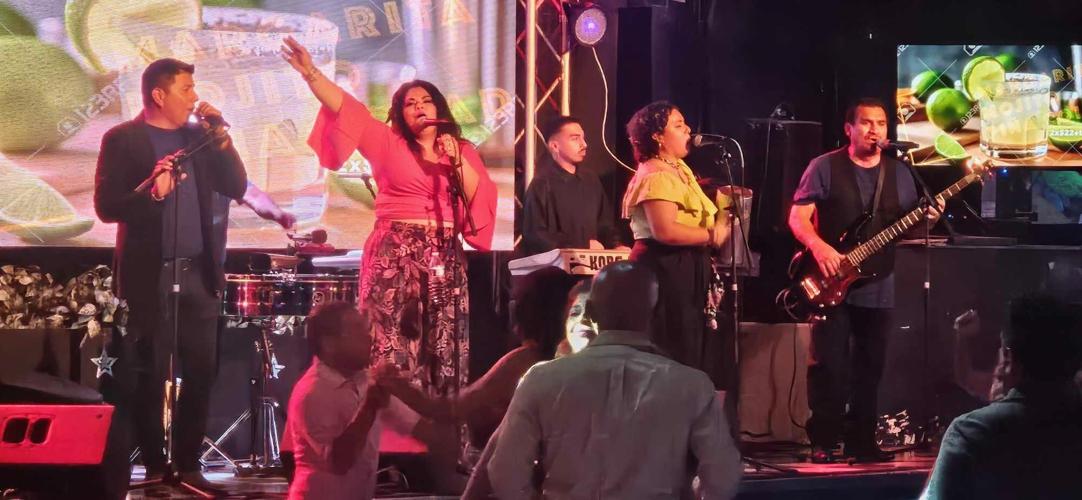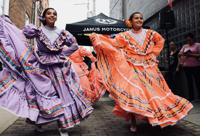
(Courtesy of Linda Nuves)
A month and a half into the ongoing and often violent immigration enforcement raids impacting Southern California, what remains is the sheer fear and uncertainty felt across the region. A fear palpable in the empty open-air shops, the missing regular street vendors on your street and the regular places of evening joy that make up Latino nightlife.
Last week, Linda Nuves, a DJ and member of the band Azucar LA, posted that her father’s band was notified that their weekly residency at the Echo Park nightclub was being canceled.
Azucar LA is part of the constellation of generational Latino venues that have offered a safe space, a compass for the end of the week, and a place of nostalgia. Jalisco Bar, Los Candiles, Los Globos, Tempo and various other bars and nightclubs serve as havens and safe spaces for immigrants.
What these venues provide is more than entertainment. They are part of a cultural ecosystem, a circulatory system for joy and refuge that immigrant communities have built and sustained over generations. The closures, cancellations and thinning crowds are more than business losses—they are fractures in the rituals of belonging.
“And it’s very special. It’s a place that I’ve been grateful to, to have like grown up as a performer and kind of watch and witness the beauty of what music can do and what music can [do] how music can heal, how music can bring joy, how music can bring lovers together,” said Nuves. “It’s just so nice to just be a performer, but also just be an observer as well.”

(Courtesy of Linda Nuves)
For her father, a lifelong musician who came to the U.S. from El Salvador, the cancellation represents both a personal and professional blow.
“I know my dad is really bummed out about the situation. This has been his passion and his livelihood since he was a kid. I mean, he grew up performing and playing music in El Salvador,” Nuves said. “And you know, he’s also very resilient. And he’s been really creative and telling me and inspiring me like, this is what we got to do for social media. And he’s got a lot of really great ideas. And, you know, he hasn’t given up. And I think that’s the beauty in all of this is that even though doors seem like they’re closing, like my dad’s already ready to open new ones or not to let things like this keep him down.”
The question for performers like Nuves and others now becomes: how do they protect not just their art, but the places where that art happens?
“Okay, so how can I myself stand up for folks?” Nuves asked.
In recent weeks, she’s been thinking about the need for transparency from venue owners, and what role artists and the community can play in building safer spaces.
“Yes. It’s in regard to venues. So it’s like, I think maybe we should have like an artist that goes and asks businesses and says, hey, can you have this sign up? Like, what are you doing? What are you? What would you do if ICE were to come at night?” she said. “Like, how are you going to protect and you know, we need to know which venues are going to protect or who or who’s going to stand up and say like, no, you guys are not welcome here or what are the protocols if XYZ happens and we need to let the public know like, hey, this venue is going to do this and this venue says they’re going to let ICE do their thing. We have so much power in where we put our money.”
It’s a conversation, she says she hasn’t formally had with venue owners yet, but she’s started talking with the workers—the misteras, the barbacks, the people behind the scenes who often know more about what really happens when immigration enforcement shows up at the door.
“Wherever we go and put our money into, l obviously that holds a lot of power -who we’re supporting. So I haven’t had this conversation with [a] club, and I’m curious, but I know - the workers like the meseras there, they’ve said they’ve mentioned that ICE isn’t allowed in there,” Nuves said. “I’m like, but I don’t see a sign. I think there needs to be a sign.”
That night, she says, she returned to perform with her father for the first time since giving birth to her child. While there, she checked in with the staff she’s known for years.

(Courtesy of Linda Nuves)
“I only got a chance to perform with my dad this last month, since I had my kid. I kind of took a little hiatus, but when my dad calls on me, I’ll go and perform,” she said. “And so I went with him, performed last month and I checked in with the misteras and the barbacks and the folks that know me there. And yeah, so I just wanted to ask how they’re feeling and they’re just like, okay, we feel good. You know, the owner says ICE isn’t welcome here. I’m like, I haven’t seen you guys post anything on Instagram or Facebook or even see a sign and I would like to see that for folks to feel comfortable and to even feel safe to even consider coming to club and I’ve seen others.”
Part of the solution, she says, is not just creating new spaces but remembering to support the ones that have been there all along.
“I also want folks to recognize or acknowledge that these spaces already exist, and if they weren’t aware of it before, at least now they know that these spaces exist, and I want folks to continue to support spaces like Club Bahia, Los Candiles, Pan American Club,” she said. “You’re a U.S. citizen, go put your money in these spaces that have already been serving the community for X, Y, and however long.”
For Nuves, supporting these venues isn’t just about attendance—it’s about respect. She’s seen what happens when people come into immigrant-serving nightlife spaces without understanding the culture.
“Yes, there’s new clubs, new spaces, and those are fun to go to, too, but also don’t forget about these spaces that have paved the way,” she said. “If you’re an ally, go to these spaces and have fun. Like, be respectful. I think that, to me, was always my thing. Because I would see folks come in and not be respectful. And they’d be making a mockery of the music. Or maybe they didn’t know how to dance it. So they had to do whatever it was to make themselves feel comfortable in these spaces.”
She points to the small acts of respect that help keep these businesses afloat—ordering drinks, tipping staff, treating the venues with the same dignity they extend to their guests.
“Come into these spaces and be respectful and keep them afloat by buying drinks at the bar, at the café. They have food. At Bahia, they have food. Buy the food, buy the drinks, tip your waitresses,” Nuves said. “Because spaces like Bahia, they have a host. And the host will take you to the seat. And you’ll sit and the waitress will come. See, because it’s classy. It’s like a classy space. There’s a coat-check. So there’s parking. You pay for it. Things like that, where it’s just like, it’s still live Latin music. They play reggaetón. They play salsa, merengue. But it’s still a classy establishment. People have respect and they have dignity. And you come there and you have a good club.”















(0) comments
Welcome to the discussion.
Log In
Keep it Clean. Please avoid obscene, vulgar, lewd, racist or sexually-oriented language.
PLEASE TURN OFF YOUR CAPS LOCK.
Don't Threaten. Threats of harming another person will not be tolerated.
Be Truthful. Don't knowingly lie about anyone or anything.
Be Nice. No racism, sexism or any sort of -ism that is degrading to another person.
Be Proactive. Use the 'Report' link on each comment to let us know of abusive posts.
Share with Us. We'd love to hear eyewitness accounts, the history behind an article.